Israel-Hamas War: What happened on day 133?
Benny Gantz: IDF will invade Rafah if hostages are not freed, war could continue into Ramadan • Gazan riots erupt near Rafah's border with Egypt
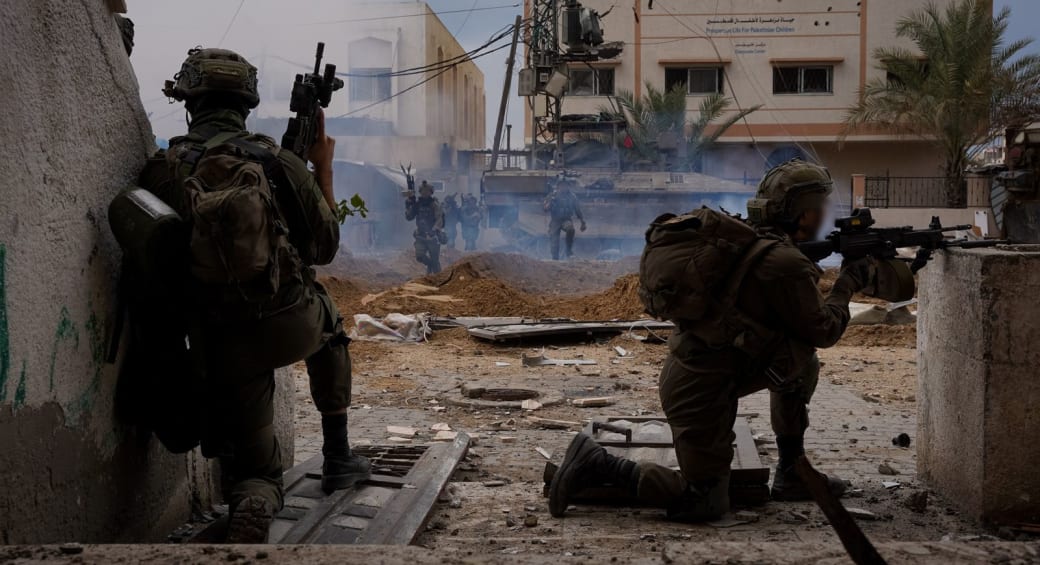
Public opinion begins to shift as Israel debates a possible hostage release deal with Hamas
Hostage negotiations between Israel and Hamas stall, with Netanyahu accusing Hamas of delusion and halting future talks.
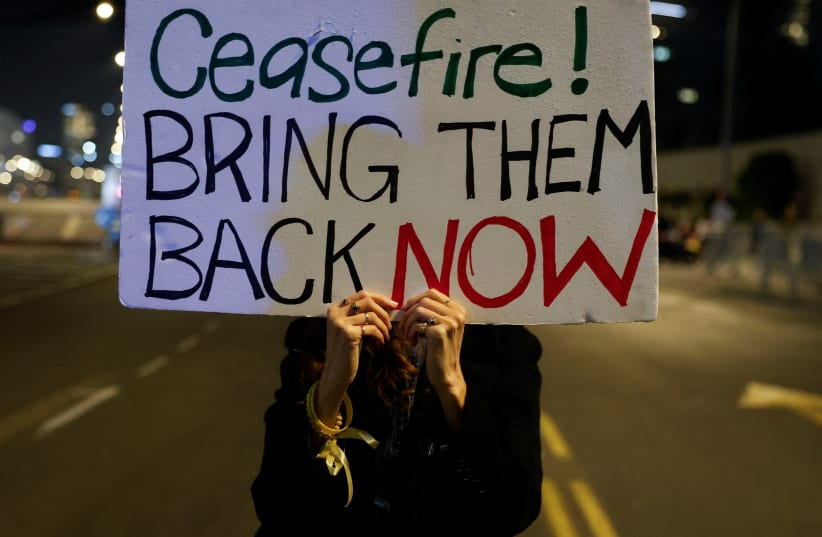
The efforts to secure a hostage release agreement between Hamas and Israel appear to be stalled on Thursday, a day after Israeli Prime Minister Benjamin Netanyahu accused Hamas of being “delusional.” The premier reportedly ordered the Israeli delegation to Cairo not to participate in future talks.
257 people were kidnapped during Hamas’s surprise offensive against Israel on October 7, most of them Israeli civilians. In response to the offensive, Israel launched a massive retaliation against the Gaza-based terrorist organization aimed at toppling Hamas and releasing the hostages.
Since then, 123 hostages have been released. Most of them were freed as part of a hostage deal with Hamas, while three were released in military operations. The fate of the remaining October hostages is unclear; while Israeli intelligence believes at least 30 are dead, there is no confirmation on the situation of any of the hostages. Four of the 134 hostages still in Gaza were abducted years before the current war. Hamas is believed to be holding the bodies of two Israeli soldiers, Hadar Goldin and Oron Shaul, who were killed in a military operation in 2014. In addition, two civilians, Avera Mengistu and Hisham al-Sayed, are being held in the Gaza Strip after straying there accidentally.
Since the abduction, the families of the hostages have been hanging on to every word in every media report. The reports fluctuate between optimism that a deal is close to being clinched to pessimism that the gap between the sides is too large to be bridged.
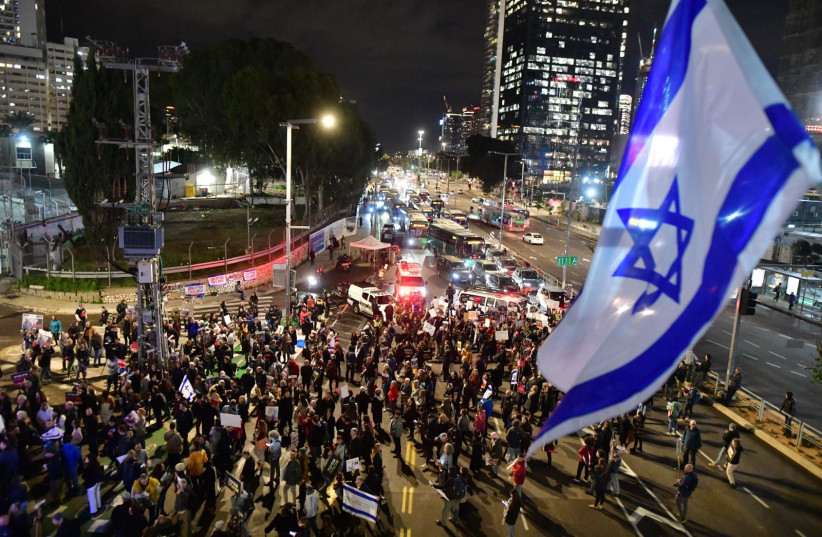
The current international effort is being led by Egypt, which has been hosting the talks between the sides, the US and Qatar, which is closely affiliated with Hamas. The negotiations have changed the discourse in Israel. Whereas at the beginning of the war, there appeared to be a wide consensus on the precedence of their release, there are an increasing number of voices that call on Israel to carefully consider the price it will pay for the release of the hostages.
Bringing back hostages 'relegated to second place'
“At first there was a public consensus on both goals of the war,” said Professor Motti Neiger from the School of Communication at Bar-Ilan University. “As the understanding that the war will take longer than a few months, there is also an understanding that the goal of hostage release is relegated to second place.”
During the last week, as reports of a stalemate in negotiations persisted, relatives of hostages demonstrated in front of the military and defense ministry headquarters in Tel Aviv.
Leah Goldin has been waiting for her son Hadar since 2014, when his body was taken by Hamas. Already jaded from the empty promises made by countless Israeli leaders, she also lays blame on the international community. Just last month, several members of the United Nations (UN) Security Council called for the “unconditional release” of hostages as a pre-condition to any ceasefire agreement. Also in January, the European Parliament, the law-making body of the European Union (EU), adopted a resolution also calling for their unconditional release. The resolution was just one of a string of resolutions adopted by various international organizations since 2014 calling for the release of those being held in Gaza before the current war, resolutions that have been ignored.
“We need to fight for our humanitarian rights no less than we do for our enemy,” said Goldin. “Hamas is violating humanitarian law and shouldn’t be given humanitarian aid. They are holding our children and our loved ones – a standing violation of international humanitarian law.”
The first hostage release deal, which took place almost two months after the war began, was met with a broad consensus in the country. Women and children were released in return for a temporary ceasefire and an increase in the flow of humanitarian aid into Gaza. Israel’s agreement to allow for humanitarian aid to enter Gaza has been met with public criticism throughout the duration of the war. In recent weeks, there have been demonstrations and attempts by people to block the crossings into Gaza, hampering the entrance of goods into the territory.
Since the beginning of the fighting, it was unclear how Israel would strive to topple Hamas while negotiating with it. Operating against it with its full military might, Israel could also risk the hostages and motivate Hamas to kill them rather than keep them alive as bargaining chips.
According to Neiger, Israel’s leadership is still hanging on to the two goals it set out, releasing the hostages and toppling Hamas while not being transparent with the public.
“These goals were probably never able to exist in parallel,” he told The Media Line. “This created an illusion, as the leadership tries to hold on to both goals, saying they support each other when they actually don’t.”
Eitan Mor was kidnapped from the Nova music festival after rescuing tens of party-goers. His father, Tzvika is against any deal that would release his son. The demands by Hamas, which reportedly include the release of thousands of prisoners, the cessation of Israel’s war effort against Hamas, and the complete withdrawal of the army from the Gaza Strip, are deemed too high.
'Hamas should pay the price, not Israel'
“Israel shouldn’t be the one to pay the price, it should be Hamas,” Mor, who founded the Tikva Forum, which is against any deal, told The Media Line. “Israeli citizens have already paid enough, and we will not risk our security by surrendering to a terrorist organization that will portray weakness to the rest of our enemies, the thousands of terrorists that will be released, and those already free that will be incentivized to carry out attacks.”
Mor is not alone. Recent polls have shown Israelis are gradually leaning against a hostage deal in the current terms being negotiated. On Wednesday, a poll conducted by the Jewish People Policy Institute showed that 40% of Israelis chose to overthrow Hamas, compared with 32% who prioritized returning the hostages. A poll conducted by the Israel Democracy Institute (IDI) in late January showed that 60% of Israeli Jews are against a deal that would secure the release of the hostages in return for releasing all Palestinian prisoners and halting the fighting in Gaza.
“My son holds the same opinion as me,” Mor told The Media Line. “This is his upbringing. Hostages should be released only by defeating the enemy.”
Amongst the relatives of the hostages, Mor is in a minority.
“But in the public, I have wide support,” he added.
In an interview with Kan radio, Israel’s public broadcaster, Ayala Metzger, the daughter-in-law of 80-year-old hostage Yoram Metzger, was highly critical of Netanyahu.
“I don’t believe him. I think he wants to prolong the war in order to remain in power,” she said about the Israeli leader whose approval ratings are plummeting. “Something stinks. This is totally crazy; how can this be considered normal to discuss the worth of hostages in numbers of Palestinian prisoners?”
In the latest demonstrations in favor of a deal, there have also been calls for early elections.
“The families are concerned that the issue will disappear from the public discourse,” said Neiger. “If it is not there, it means the issue has become less important.”
Many of the families have called for the release of all Palestinian prisoners in exchange for their loved ones, saying Israel can deal with toppling Hamas after such a deal would be completed.
“We are smarter. We can settle the score with Hamas later,” Metzger said.
Leah Goldin’s phone has been bombarded with calls and messages since the current hostage crisis began.
“If Israel would have insisted on the release of Hadar and Oron properly, none of this would have happened, this is what I think, and this is what people told me,” she said, also laying the blame on Israel’s current leadership of whom many are still in decision-making positions today, including Netanyahu. “They created this failure, and they are still calling the shots now. Why aren’t they using international humanitarian law? Why hasn’t this happened for over 9 years? Why is Hamas treated as equal?”
UN Security Council resolution 2474, adopted in 2019, calls for the return of “persons reported missing during armed conflict…without adverse distinction.”
In 2011, Israel released over 1,000 Palestinian prisoners in exchange for one captive Israeli soldier. It was a deal that initially received massive public support. But later, it became a deal that scarred Israelis; as the prisoners were released, it became apparent that many of them continued to plot against the Jewish state. Yahya Sinwar, the current leader of Hamas in Gaza and the mastermind behind the October 7th offensive, was one of the prisoners released in the exchange after his four life sentences were cut short by the deal.
“I cry for my son every day,” said Tzvika Mor, who opposed the deal at the time and continues to hold his position. “But I have not lost my compass. Of course, I want him home, but paying a price for him will exact a price on others, and this is forbidden.”
For now, the gap between Israel and Hamas is apparently too wide. However, increased international pressure for a ceasefire on Israel’s part and on Hamas to agree could lead to a change.
Go to the full article >>US affirms Hamas is terror group after UN says it's a political one
“Hamas is a terrorist organization,” White House National Security Communications Advisor John Kirby told reporters in Washington on Thursday.
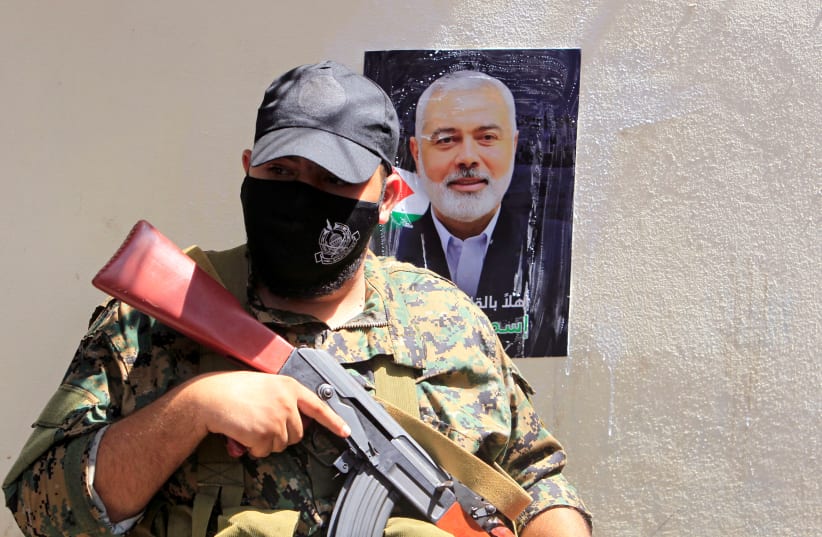
The White House affirmed that Hamas was a terror group after a top UN official claimed that it was a political organization.
“Hamas is a terrorist organization,” White House National Security Communications Advisor John Kirby told reporters in Washington on Thursday.
“And you don't have to look any further than what they did on the 7th of October to see it in stark terms,” Kirby said as he referenced the Hamas-led attack against southern Israel in which over 1,200 people were killed and another 253 seized as hostages.
“My goodness, take a look at their manifesto, even the one that’s so-called watered down in 2017,” Kirby said.
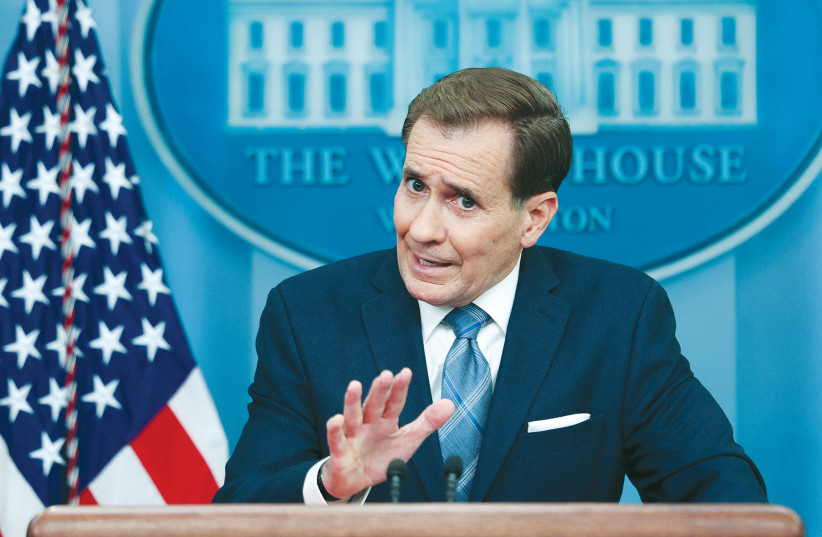
“There's no doubt they just want to wipe Israel off the face of the map. This is a terrorist organization, pure and simple. Period,” he stressed.
He spoke after Under-Secretary-General for Humanitarian Affairs and Emergency Relief Coordinator Martin Griffiths said that “Hamas is not a terrorist group, for us, of course as you know. It’s a political movement” during an interview with Sky News in which he appeared to legitimize the group on behalf of the UN.
His words were widely circulated on social media and denounced by Israel and a number of its allies.
Officials respond to Griffith's claim
Foreign Minister Israel Katz posted on X that, “The @UNReliefChief denies that the Nazi organization Hamas is a terrorist organization and calls it a "political movement". Shame on him.”
The German Foreign Office said, “To make it crystal clear: The EU has listed Hamas as a terrorist organization and so have many others.”
Germany’s Ambassador to Israel Stephen Seibert commented on the post, stating on X, “I didn’t expect that this still needed to be said.”
Griffiths later clarified in a post on X that “Hamas is not on the list of groups designated as terrorist organizations by the United Nations Security Council.
“This doesn't make their acts of terror on 7 October any less horrific and reprehensible, as I've been saying all along.”
But he did not address the part of his comment in which he referred to them as a political group.
UN Secretary-General Antonio Guterres’s spokesperson Stephan Dujarric told reporters in New York that UN officials, including Martin Griffiths, have unequivocally condemned the abhorrent terrorist attack that Hamas conducted on October 7th and that there could be no justification for them.
“That position is unchanged,” he stressed.
A UN official told The Jerusalem Post that, “There are different parts to Hamas. There's a political element to Hamas as there is also an armed element.
“The UN has always condemned acts of terror committed by Hamas. We also have to deal with them as the de-facto authorities in Gaza."
Go to the full article >>Gaza war a burden on soldiers' partners, new study shows
Figures show 46.8% of working mothers experience sleep difficulties compared to 24.1% of fathers.
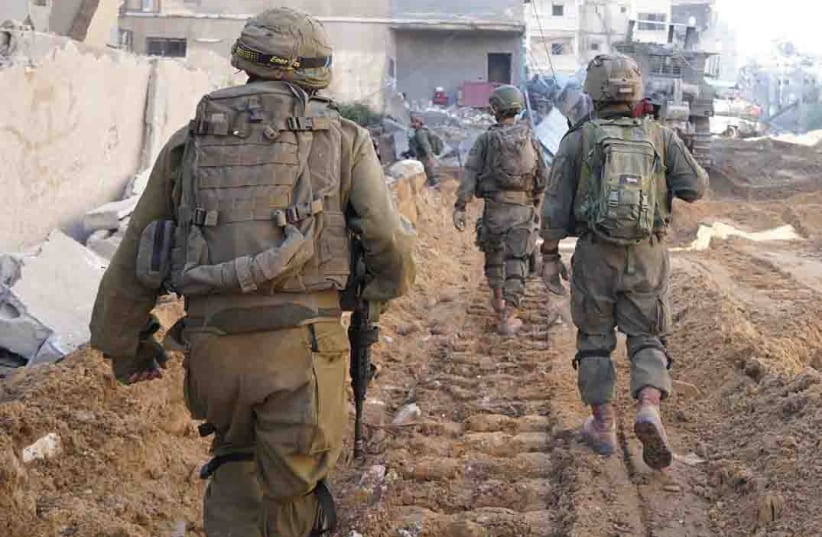
Wives of reservists who are fighting in Gaza are really suffering – torn between caring for their children at home and working at their regular jobs (if they haven’t been dismissed).
A new study by the Israel Institute for Occupational Safety and Health (IIOSH) has just unveiled the heavy burden of war on soldiers’ partners – 46.8% of working mothers experience sleep difficulties compared to 24.1% of fathers; and 48.7% of working mothers experience very high levels of fatigue at work compared to 32% of fathers.
The effects of the war directly impact the health of workers in Israel who are struggling under pressure. Work-related stress is a result of excessive burdens that female employees or self-employed struggle with to cope with. To various Untreated chronic stress can lead to sleep problems, fatigue, depression, and physical problems like headaches and digestive issues. The pressures may even increase the risk of physical illnesses such as diabetes and heart diseases.
According to recent data presented in the Knesset Economic Affairs Committee, 30% of female workers called up for reserve duty reported a change in employment status; six percent of these women were fired from their jobs, and eight percent were placed on unpaid leave. In addition, 86% of self-employed individuals in Israel reported a drop in their income.

Women experience higher levels of fatigue and anxiety than men
A new study conducted by the IIOSH among 1,498 workers employed during the summer examined the physical and psychological effects on workers in Israel, including gender differences among workers in Israel. The survey was conducted during the summer months of 2023 and during the early stages of the war in December.
The research findings clearly show that women experience higher levels of fatigue, anxiety, and sleep difficulties compared to men. Nearly half of women experience sleep difficulties compared to 26.3% among men. 46.3% experience very high levels of fatigue compared to 32% among men.
Among working mothers with children under 18, the gender disparities are even more pronounced – 46.8% of working mothers experience sleep difficulties compared to 24.1% of fathers; 48.7% of working mothers experience very high levels of fatigue at work compared to 32% of fathers.
The research also found that single women lost their jobs and were unemployed almost twice as much as married women (10.1% compared to 5.9%), and more women lost their jobs than men (7.3% compared to 3.9%). 9.6% of men were in reserve duty or still in reserve duty at the beginning of December, and 1.2% of women.
The IIOSH presented recommendations on how to ease the burden of these women:
Identification and assessment of risks: Employers must identify and clearly understand the current situation; be alert and continuously monitor patterns or behaviors exhibited by workers indicating mental distress like excessive sick days, high employee-turnover rates, fatigue and lack of concentration, irritability and decreased performance indicators.
Communicate with workers, listen to them, and plan goals, needs, and requirements that are appropriate to this period of time. Workers understand the organization’s needs and want to be helpful. In many cases, they likely feel guilty towards their colleagues and clients and their role. A renewed definition of requirements from workers along with them and defining the scope of work and appropriate schedules will enable them to undertake achievable tasks, contribute to the collective effort, and maintain motivation and commitment.
Rami Be’za, chairman of the Freelancers and Self-Employed Forum, charged that the state neglects the female self-employed in Israel who struggle under this unique burden.
"The government announced plans for a ‘Recruiting for Reserves’ program to supposedly help the self-employed, but in reality, there is no budget for the program, and the debts of the self-employed continue to grow. How do you expect such people to cope? Why isn’t the plan addressing extending maternity leave for self-employed individuals or incentives for growth that are supposed to assist with future business impact? Until we receive answers to these details, more and more self-employed people will collapse with an unbearable debt and fatigue. The self employed urgently need oxygen, or there will be no one left to save.”
IIOSH director-general Dr. Miki Winkler concluded that during this war, “female workers are facing many challenges related to maintaining their jobs amidst the economic crisis and caring for their children while their spouses are in reserve duty. Singles who bear a heavier burden must also be helped. Employers should pay attention to warning signs and create a supportive work environment that preserves their health and also helps increase productivity at work. We invite employers to use our counselling and guidance service to maintain workers’ mental and physical health.”
Go to the full article >>IDF arrests three suspects in West Bank, confiscate terror funds
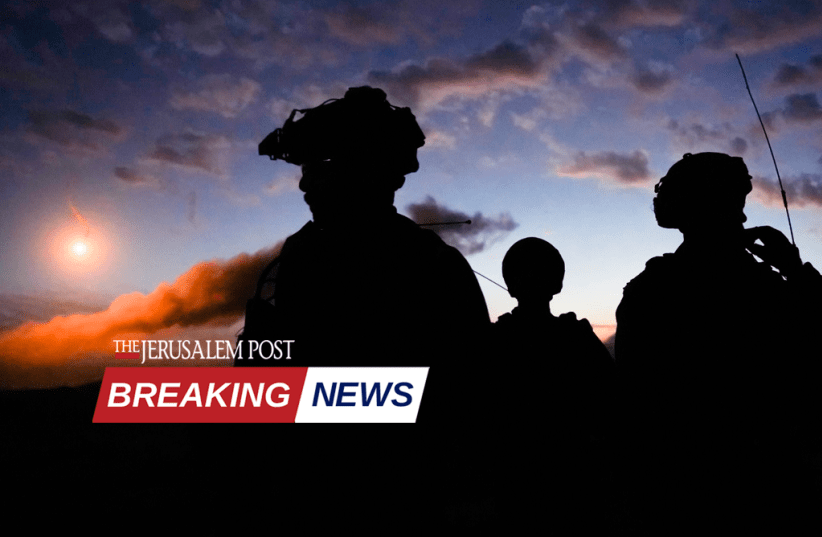
The IDF, Shin Bet, and Border Police arrested three suspects in the West Bank on Thursday night and seized thousands of shekels that were suspected of being intended for terrorist operations.
The suspects were arrested in Aqaba and Silat ad-Dhahr. The terrorist funds were seized in Hebron.
Since the beginning of the war, over 3,100 suspects have been arrested by Israeli forces in the West Bank, including over 1,350 who are affiliated with Hamas.
Go to the full article >>Netanyahu rejects unilateral Palestinian statehood after Biden call
״Israel outright rejects international dictates regarding a permanent arrangements with the Palestinians," Netanyahu wrote.
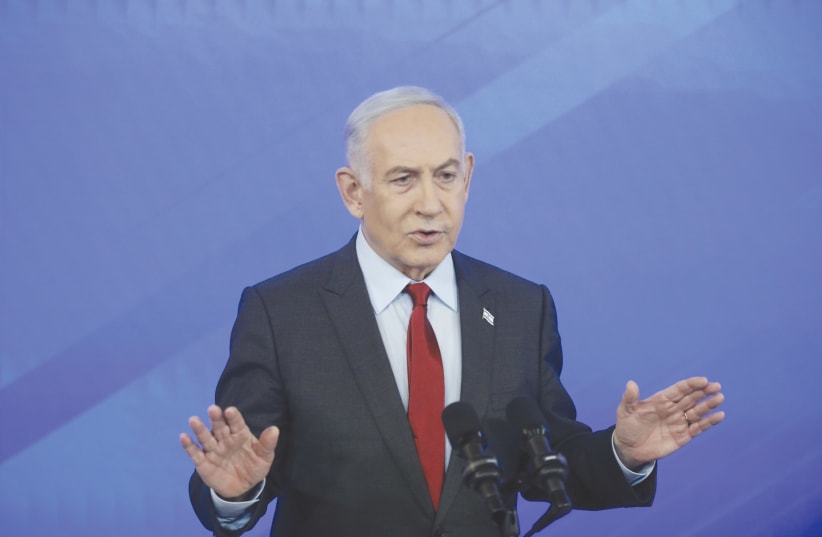
Prime Minister Benjamin Netanyahu rejected all plans for unilateral recognition of Palestinian statehood after he spoke with US President Joe Biden for 40 minutes and after the security cabinet met.
“At the cabinet meeting, I clarified my position regarding the recent talk of imposing a Palestinian state on Israel,” Netanyahu wrote in a post on X.
“These two sentences sum up my position,” he explained.
״Israel outright rejects international dictates regarding a permanent arrangements with the Palestinians. Such an arrangement will be reached only through direct negotiations between the parties, without preconditions,” Netanyahu wrote.
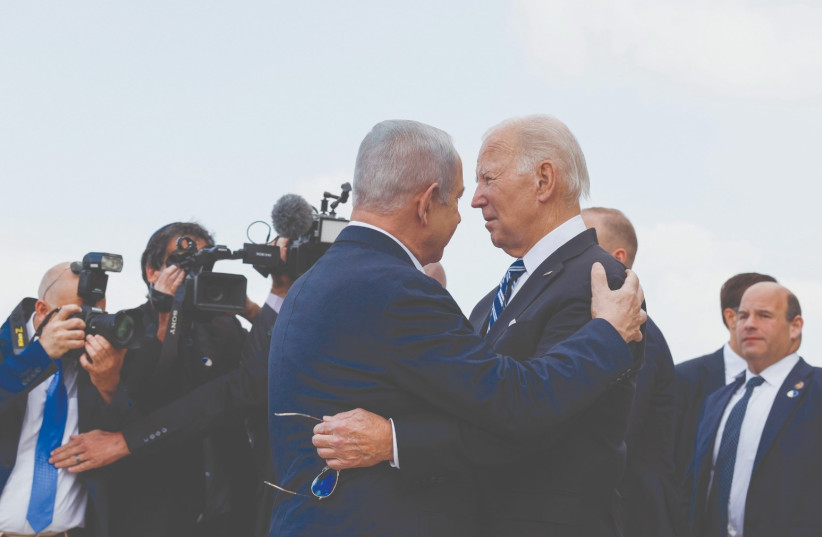
“Israel will continue to oppose the unilateral recognition of a Palestinian state. Such recognition in the wake of the October 7 massacre would give a huge reward to unprecedented terrorism and prevent any future peace settlement,” Netanyahu stressed.
He spoke in the early hours of Friday after The Washington Post published an article the previous day about US plans with Arab allies to advance a two-state resolution to the conflict as part of a larger regional arrangement that would involve a Gaza ceasefire and Saudi normalization with Israel.
A number of European countries have also weighed unilateral Palestinian statehood recognition in light of the Israel-Hamas war.
Netanyahu has rejected full Palestinian statehood in favor of an autonomous Palestinian government in territory outside sovereign Israel but under IDF security control.
Finance Minister Bezalel Smotrich who is opposed to a Palestinian state had called on the security cabinet, which met Thursday night, to publicly reject any such plan.
Tensions regarding war in Gaza
Netanyahu’s comments come amid growing tension between him and Biden over critical issues regarding the Gaza war and the hostages.
CIA Director William Burns was in Israel on Thursday to discuss the stalled hostage talks with Netanyahu, a top that was also raised during the Prime Minister’s call with Biden.
Hamas has insisted that any deal must include a permanent ceasefire and the complete withdrawal of IDF forces from Gaza, two dictates Israel has rejected. But the US holds that there are still other areas of flexibility, such as with regards to demands on the release of Palestinian terrorists, where Israel could show flexibility.
Biden “reaffirmed his commitment to working tirelessly to support the release of all hostages as soon as possible, recognizing their appalling situation after 132 days in Hamas captivity,” the White House said after the call.”
The US has also asked Israel to take steps to ensure that increased humanitarian aid reaches Gaza and that the IDF presents a plan to protect Palestinian civilians during its planned military campaign into Rafah.
“The President and the Prime Minister also discussed the situation in Gaza and the urgency of ensuring that humanitarian assistance can get to Palestinian civilians in desperate need,” the White House said.
“The President also raised the situation in Rafah, and reiterated his view that a military operation should not proceed without a credible and executable plan for ensuring the safety of and support for the civilians in Rajah,” it added.
Go to the full article >>Poland chief rabbi leads Israel delegation to memorialize October massacre
The group met with the families of hostages, evacuees from the Gaza area, soldiers, and President Isaac Herzog.
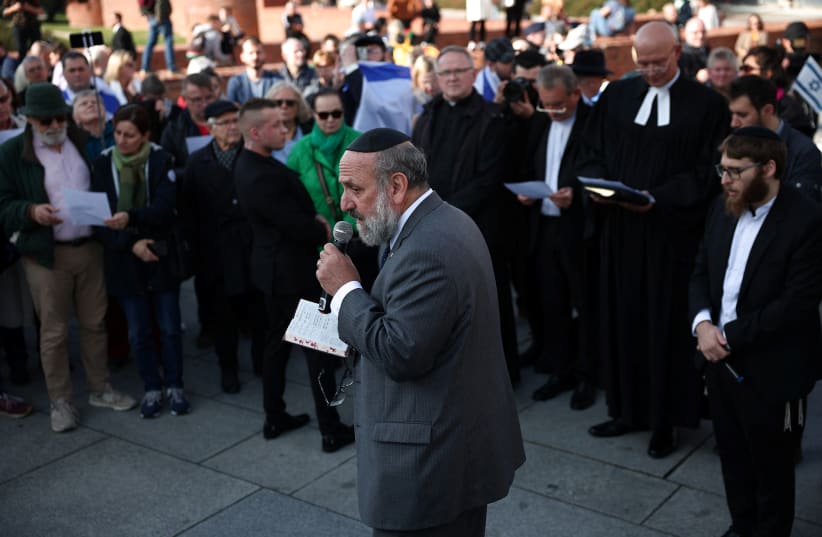
WARSAW, POLAND — Chief Rabbi of Poland Michael Schudrich led a delegation of four other Polish Jewish community leaders to visit Israel this week to show solidarity with Israelis in the wake of the October 7 massacre.
The group met with the families of hostages, evacuees from the Gaza area, soldiers, and President Isaac Herzog. They visited the sites of the massacres and fighting in Israel, including Netivot, Sderot, Re’em, Kissufim, and Be’eri.
While normally it is Israelis sending delegations to Poland to visit Holocaust sites, Schudrich said the objective was to show Israelis “We’re with you, we’re one people,” and “also to see for ourselves and tell about it to more of our people, not only the Jewish community, but the [Polish] community at large.”
Shudrich said that at the beginning of the war, when many other solidarity missions arrived, his community was busy in Poland “getting the message out.”
“We’ve never done a solidarity mission before from Poland,” said Shudrich. “All five of us feel the obligation to go back and tell others.”
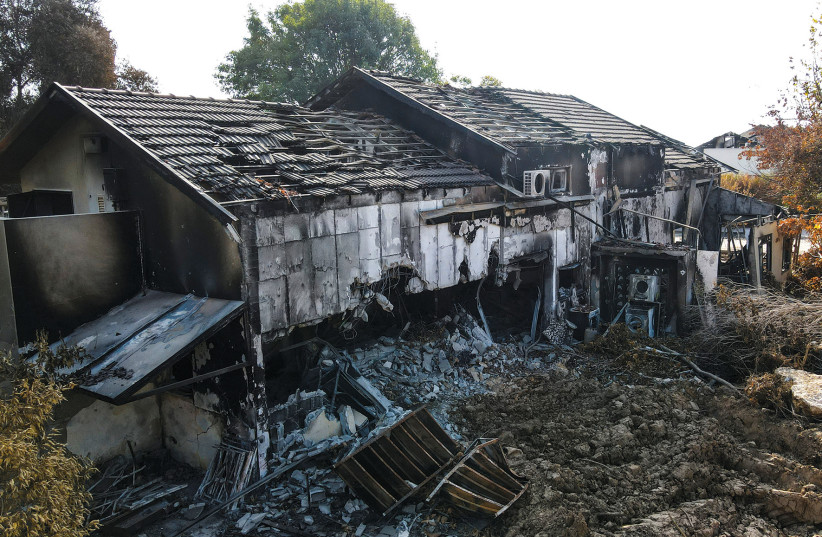
October 7 was a terrible pogrom, but Shudrich said that it wasn’t the Holocaust because the State of Israel and the Israel Defense Forces exist.
“While it didn’t work perfectly on 7 it did on October 8,” he said.
The pogrom and the Holocaust were “not the same thing, but on the other hand, we hear things on the human level that resonate in the same way.”
'I feel great hope for the beautiful Jewish people'
Shudrich said that he had the honor of helping soldiers stationed at a base near Kissufim. They had ordered tactical pants and shirts from Poland, but the shipments were canceled due to Houthi maritime terrorism. The soldiers contacted Shudrich, and he brought the tactical uniforms with him.
“To be able to see our soldiers, these gibborim, was incredibly important,” said Shudrich.
The rabbi said he also found his meeting with Herzog inspiring, because the president asked about the Jews of Poland, while Polish Jews were worrying about Israelis. Due to the capacity of being able to show so much care for one another, “I feel great hope for the beautiful Jewish people.”
The idea for the trip was his, said Shudrich. World Mizrachi said it worked to coordinate the delegation. The movement has worked to organize dozens of delegations from communities across the globe.
“In a time when the State of Israel is in deep pain and we are confronting an ongoing security threat on multiple fronts, it has been so encouraging to see how the Jewish people have a real desire to be here with us,” said World Mizrachi acting COO Rabbi Danny Mirvis. “The missions that we are able to facilitate are designed to be far more than ‘bearing witness’ trips but give people the sense that they are truly experiencing what Israel is going through and are able to demonstrate that the concept of one people with one heart is really what defines us as a nation.”
Go to the full article >>Egypt setting up area at Gaza border which could be used to shelter Palestinians - sources
One of the sources said Egypt was optimistic talks to clinch a ceasefire can avoid any such scenario, but is establishing the area at the border as a temporary and precautionary measure.
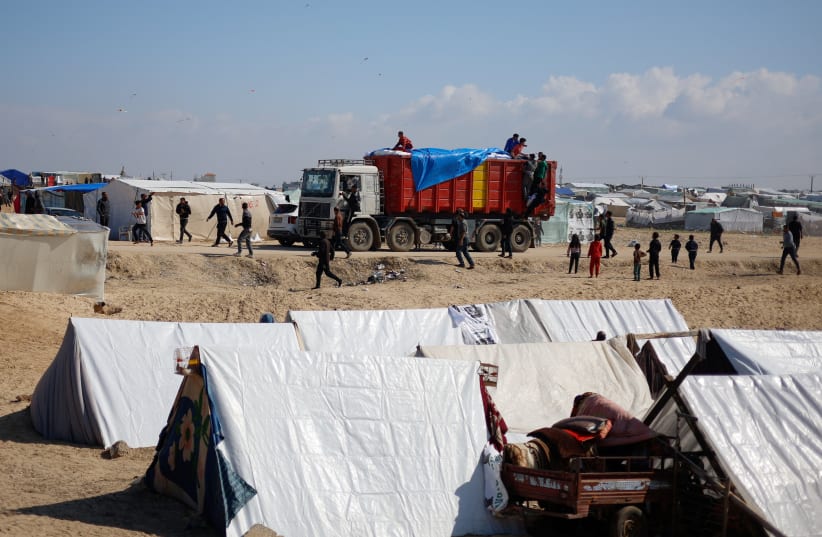
Egypt is preparing an area at the Gaza border which could accommodate Palestinians in case an Israeli offensive into Rafah prompts an exodus across the frontier, four sources said, in what they described as a contingency move by Cairo.
Egypt, which denied making any such preparations, has repeatedly raised the alarm over the possibility that Israel's Gaza offensive could displace Palestinians into Sinai - something Cairo says would be completely unacceptable- echoing warnings from Arab states such as Jordan.
The United States has repeatedly said it would oppose any displacement of Palestinians out of Gaza.
One of the sources said Egypt was optimistic talks to clinch a ceasefire can avoid any such scenario, but is establishing the area at the border as a temporary and precautionary measure.
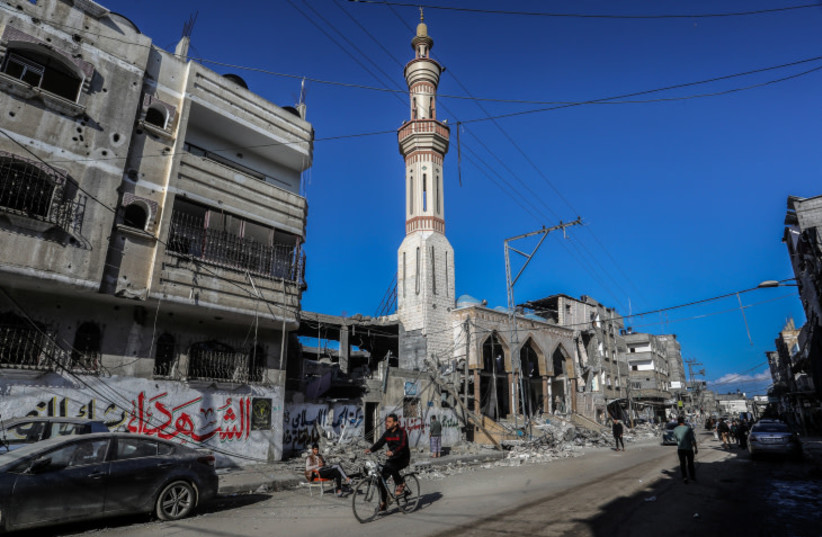
Three security sources said Egypt had begun preparing a desert area with some basic facilities which could be used to shelter Palestinians, emphasizing this was a contingency step.
The sources Reuters spoke to for this story declined to be named because of the sensitivity of the matter.
Israel has said it will mount an offensive to take out Hamas's "last bastion" in Rafah, where well over 1 million Palestinians have sought sanctuary from its Gaza offensive.
Israel has said its army is drawing up a plan to evacuate civilians from Rafah to other parts of the Gaza Strip.
But UN aid chief Martin Griffiths said on Thursday it was an "illusion" to think people in Gaza could evacuate to a safe place and warned of the possibility of Palestinians spilling into Egypt if Israel launches a military operation in Rafah.
He called this scenario "a sort of Egyptian nightmare."
Egyptian opposition
Egypt has framed its opposition to the displacement of Palestinians from Gaza as part of wider Arab rejection of any repeat of the "Nakba," or "catastrophe," when some 700,000 Palestinians fled or were forced from their homes in the war surrounding Israel's creation in 1948.
The first source said construction of the camp began three or four days ago and it would offer temporary shelter in any scenario of people crossing the frontier "until a resolution is reached."
Asked about the accounts by the sources, the head of Egypt's State Information Service said: "This has no basis in truth. Our Palestinian brothers have said and Egypt has said that there is no preparation for this possibility."
Sinai Foundation for Human Rights, an activist organization, published images on Monday it said showed construction trucks and cranes working in the area and images of concrete barriers.
Citing an unidentified source, the Sinai Foundation said that the construction work was intended to create a secured area in case of a mass exodus of Palestinians.
Reuters was able to confirm the location of part of the video as Rafah from the position of the buildings, trees and fences which match satellite imagery of the area.
Reuters was not able to confirm the location of the whole of the video or the date on which it was filmed.
Israel ties under pressure
Some 1.5 million Palestinians are currently in Rafah, more than half of the Gaza Strip's population, according to the UN agency for Palestinian refugees.
Israel says it needs to expand its assault into Rafah to wipe out Hamas, the terror group behind the October 7 attack in which 1,200 people were killed in Israel and another 250 abducted.
With more than 28,000 people already killed in Israel's offensive in Gaza, according to health authorities in Hamas-run Gaza, the fate of people sheltering in Rafah has become a point of international concern, including for Israel's Western allies.
US President Joe Biden has told Israeli Prime Minister Benjamin Netanyahu that Israel should not proceed with a Rafah operation without a plan to ensure the safety of the people sheltering there.
A US State Department spokesperson said: "The president has been clear that we do not support the forced displacement of Palestinians from Gaza. The US is not funding camps in Egypt for displaced Palestinians."
Netanyahu's office has ordered the army to draw up a plan to evacuate Rafah. But no plan has emerged yet.
Netanyahu, in an interview with ABC News, said they could go to areas north of Rafah cleared by the army.
Avi Dichter, Israel's Agriculture and Rural Development Minister of agriculture, said on Wednesday the evacuation was "a military issue" and the Israeli army knew how to do it.
In comments to Israel's Army Radio, Dichter said there was "enough land west of Rafah," and mentioned Al Mawasi - an area on the shore to which the Israeli military said civilians should flee early in the offensive.
The Gaza war has piled pressure on relations between Egypt and Israel, which signed a peace deal in 1979.
Arab League Secretary General Ahmed Aboul Gheit, a former Egyptian foreign minister, said earlier this week Israeli actions threatened the continuity of agreements with Egypt and Jordan - a reference to peace treaties with both Arab states.
Egyptian Foreign Minister Sameh Shoukry said on February 12 Egypt had maintained the agreement for 40 years and would continue to do so as long as both sides were committed to it.
Go to the full article >>IDF publishes the name of a fallen soldier
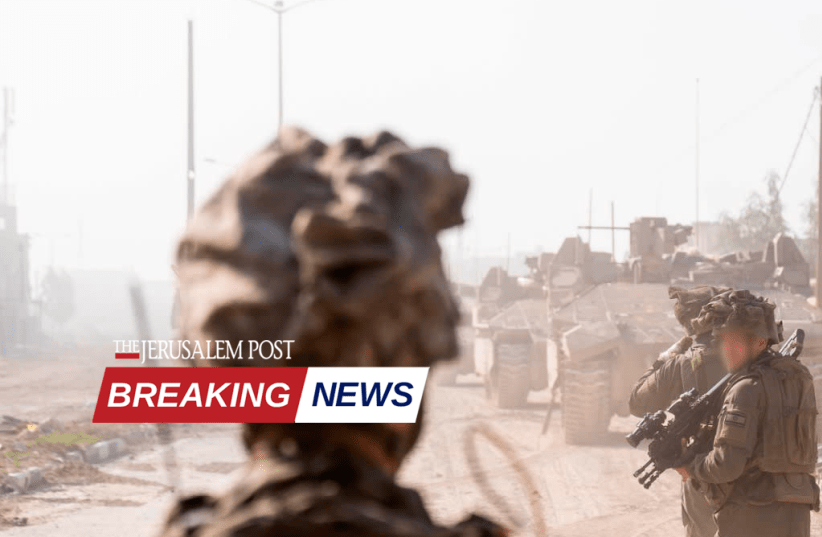
St.-Sgt. Noam Haba, 20 years old from Jerusalem, fell in combat on February 15.
He was a fighter in the 202nd Battalion, Parachute Brigade, and fell in battle in the south of the Gaza Strip. His family has been notified.
Go to the full article >>US VP to meet with Israel president, Iraqi PM in Munich

US Vice President Kamala Harris will meet with Israeli President Isaac Herzog and Iraqi Prime Minister Mohammed Shia al-Sudani at the Munich Security Conference on Friday, the White House said.
Go to the full article >>Egypt building border wall as Israel assaults Rafah - WSJ
The wall, which is set to span 8 square miles, is being developed as Egyptian officials fear refugees from Gaza will flood into the country after Israel removes Hamas from power.
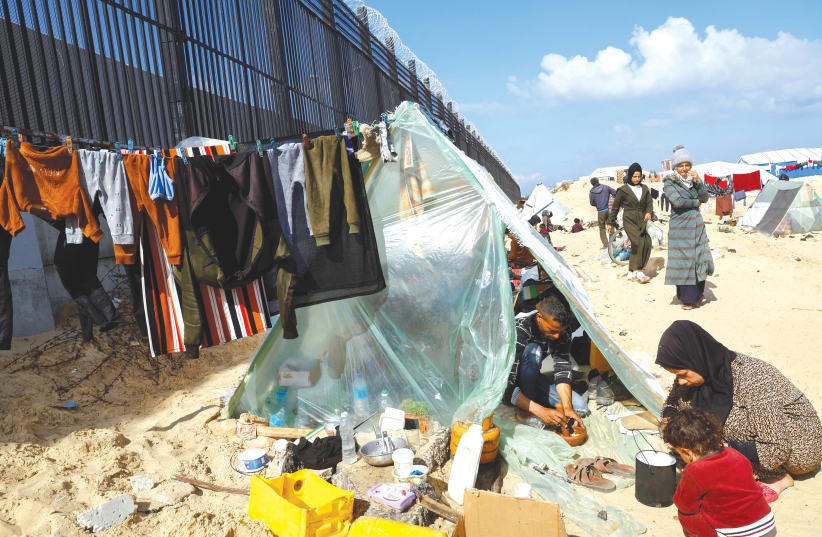
Egypt is constructing a wall along its border with the Gaza Strip in Rafah, where 1.3 million civilians remain displaced as Israel clashes with Hamas terrorists, Egyptian officials told the Wall Street Journal on Thursday.
The wall, which is set to span 8 square miles, is being developed as Egyptian officials fear refugees from Gaza will flood into the country after Israel removes Hamas from power. Arab media first reported the construction in December, though the WSJ and New York Times have now confirmed the development of a barrier along the Egypt-Gaza border.
Egypt has previously declared its opposition to any Israeli offensive in the southern Gaza Strip that could destabilize its border with the strip. The Egyptian foreign ministry said on Sunday Sunday of the “grave consequences” of an Israeli military operation in Rafah and called on Israel to refrain from “taking measures that would further complicate the situation and would harm the interests of everyone involved without exception.”
Israel’s push for a Rafah operation comes as it is under heavy international pressure to halt the war and amid growing tension with the Biden administration, which has not sought to hide its frustrations with Israel even as it continued to support its battle against Hamas.
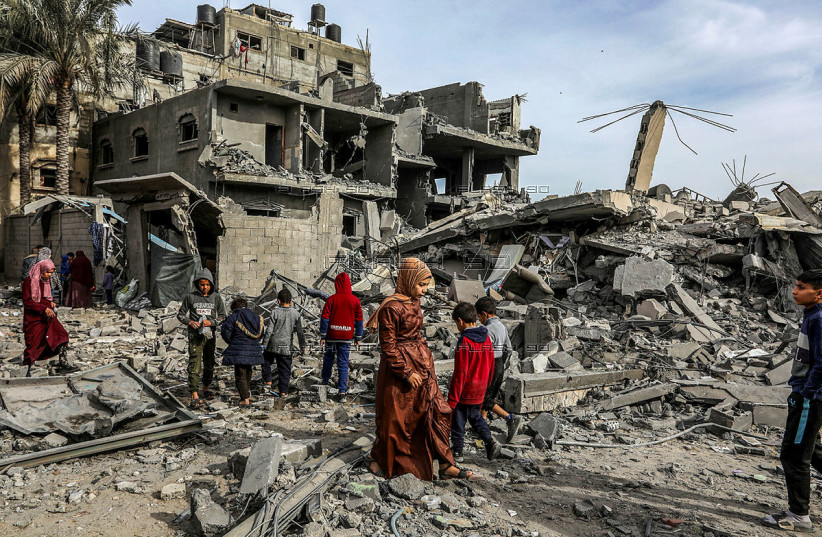
While Western media has reported that Egypt has threatened to suspend ties with Israel if the IDF launches an offensive in Rafah in southern Gaza, Army Radio cited Egyptian officials as saying on Sunday that Egypt would not act to prevent an offensive in Rafah as long as civilians aren't harmed.
Egypt’s border with Gaza
The IDF informed Egypt of its intention to occupy the border area on the "Philadelphi" Rafa route and asked the Egyptian soldiers to clear the border, according to Arab media reports in December.
Egypt has repeatedly voiced its refusal to provide a haven to Gazan refugees fleeing the war, with Egyptian Prime Minister Mostafa Madbouly saying that Cairo is "ready to sacrifice millions of lives to protect our territory from any encroachment” in an October 31st speech.
The two countries have maintained a blockade on Gaza, strictly limiting the movement of people and goods across its borders, after Hamas took control there in 2007.
Tovah Lazaroff and Reuters contributed to this report.
Israel-Hamas War: What you need to know
- Hamas launched a massive attack on October 7, with thousands of terrorists infiltrating from the Gaza border and taking some 240 hostages into Gaza
- Over 1,200 Israelis and foreign nationals were murdered, including over 350 in the Re'im music festival and hundreds of Israeli civilians across Gaza border communities
- 134 hostages remain in Gaza, IDF says